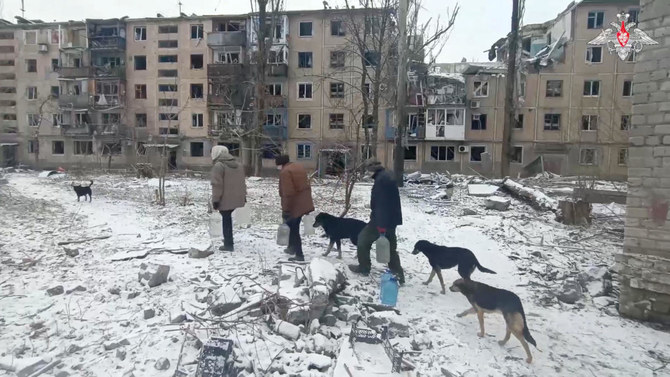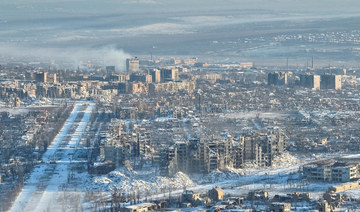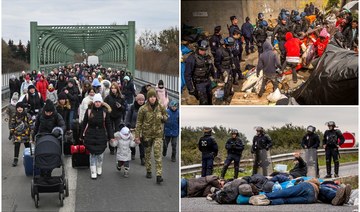GENEVA: The UN said Thursday more than 14 million people had fled their homes in Ukraine during the two years since the Russian invasion, with nearly 6.5 million now living outside the country as refugees.
Reflecting on the February 24 second anniversary of the full-scale invasion, the UN’s International Organization for Migration (IOM) said that in addition to the refugees abroad, some 3.7 million people remain displaced within Ukraine.
Over 4.5 million people have returned home to date, from either abroad or displacement within the country.
In total, more than 14 million people — nearly one third of Ukraine’s population — have fled their homes at some point during the war.
“The destruction is widespread, loss of life and suffering continues,” IOM director general Amy Pope said in a statement.
“IOM commends the government of Ukraine and the Ukrainian people for their strength and resilience, as well as Ukraine’s neighbors who are taking in those seeking safety. We remain fully committed to alleviating human suffering and helping recovery.”
The United Nations agency said it had supported 6.5 million people in Ukraine and across 11 countries in eastern Europe hosting refugees.
“As the war enters a protracted phase, however, needs continue to grow and outpace available resources,” the agency said.
In the first two years of the conflict, the IOM has received $957 million in donations.
“We count on increased support from donors and local partners to meet the challenges that lie ahead in providing a better life for Ukrainians,” said Pope.
The Russian invasion was the biggest of a European country since World War II and triggered the largest refugee crisis the continent has faced since the 1939-1945 conflict.
The United Nations overall says it needs $4.2 billion this year to provide humanitarian aid in Ukraine and to refugees who have fled but fears a likely shortfall as the Gaza war dominates global attention.
Of those who fled and have now returned to their homes, “many have encountered lasting challenges... including insecurity, loss of livelihoods, damaged housing and infrastructure, and strained services,” said Soda Federico, director of the IOM’s humanitarian response and recovery department.
“We must focus on economic recovery,” he said in the agency’s report on the first two years of the war.
UN says 14 million fled homes in Ukraine since Russian invasion
https://arab.news/btfxb
UN says 14 million fled homes in Ukraine since Russian invasion

- In addition to the refugees abroad, some 3.7 million people remain displaced within Ukraine
- The Russian invasion was the biggest of a European country since World War II
Russian warships make routine visit to Cuba

The patrol ship Neustrahimiy, training vessel Smolniy and support vessels, all from the Baltic Fleet, are scheduled to depart on Tuesday
HAVANA: Havana residents watched from shore on Saturday as Russian warships arrived for the second time in as many months, in a visit that Cuba called routine.
Cuban authorities sent shots into the air to signal their welcome, while curious fishermen watched from Havana’s waterside promenade as the ships advanced up the bay. Russian residents were also among the few up early to see the fleet’s arrival.
The patrol ship Neustrahimiy, training vessel Smolniy and support vessels, all from the Baltic Fleet, are scheduled to depart on Tuesday.
A brief statement by the Cuban Revolutionary Armed Forces described their arrival as routine.
The US State Department and Pentagon did not immediately respond to a request for comment.
A Russian nuclear submarine, frigate and support ships in June also flexed Moscow’s muscles in the port of Havana, less than 100 miles (160 km) from Florida.
Tensions between the United States and Russia have increased since Russia’s 2022 invasion of Ukraine, and Russian naval activity — though routine in the Atlantic — has ratcheted up because of US support for Ukraine, US officials say.
Simultaneously, relations between Cold War allies Russia and Cuba have markedly improved as the Communist-run country battles an economic crisis it charges is due mainly to US sanctions.
High-level contacts between the two countries have increased to a level not seen since the fall of former benefactor the Soviet Union with Cuban President Miguel Diaz-Canel visiting Moscow four times.
Russia has sent oil, flour and increasing numbers of tourists to the cash and goods short Caribbean nation as citizens suffer through daily power outages and other travails resulting in scattered protests and record migration.
Ana Garces, a 78-year-old retiree, told Reuters she remembered the then-Soviet Union was the only country to help Cuba during the 1962 missile crisis, the peak of tensions with Washington when the world teetered on the brink of nuclear war.
“We are very grateful,” she said. “Why should we not receive it with open arms? This is friendship. All kinds of ships have entered here.”
“It shows how other countries do support us and takes away a little of the world’s mentality about our country,” added her husband, 71-year-old retiree Rolando Perez.
Bangladeshi police arrest student protest leaders from hospital

- Police say they arrested three student leaders ‘to keep them safe’
- Two of them were still undergoing treatment, hospital worker says
DHAKA: Bangladeshi police have discharged from hospital and arrested the leaders of a student protest that led to nationwide unrest last week, when security forces clashed with demonstrators.
Students have been demonstrating since the beginning of July against a rule that reserves a bulk of government jobs for the descendants of those who fought in the country’s 1971 liberation war.
At least 209 people have been killed and thousands injured, according to a count based on reports in the local media after the protests turned violent last week.
Most of the casualties were reported in Dhaka, which saw intense clashes between protesters, government supporters, police and paramilitary troops, when the country went into a communications blackout for six days.
Among the injured were student leaders Nahid Islam and Asif Mahmud, coordinators of Students Against Discrimination, the main protest organizing group. They were patients at Gonoshasthya Hospital in Dhaka, from where they were arrested by the Detective Branch of Dhaka Metropolitan Police on Friday evening. Another student leader visiting Islam and Mahmud, Abu Baker Majumder, was detained as well.
Detective Branch chief Harun Or-Rashid told reporters in Dhaka on Saturday that the trio had been detained “for security reasons” as their families were worried about their safety.
“We took them in our custody to keep them safe,” he said.
The student leaders were arrested by a group of more than a dozen plainclothes officers despite objections from medical staff, a hospital worker told Arab News.
“At first, we tried to make them understand that without proper protocols, admitted patients couldn’t be released from the hospital. Later on, they talked with our authorities, and the students were taken from the hospital. There was no way we could hold them further,” the hospital worker said on condition of anonymity.
“The students’ health was not so good ... Asif was dealing with low blood pressure, and Nahid was suffering from blood clots and bruises on different parts of his body. Both of them needed further treatment.”
The arrests come in a crackdown launched by police in Dhaka, where a curfew imposed last week was still in place.
Liton Kumar Saha, joint commissioner of the Dhaka Metropolitan Police, said that 2,284 people have been arrested in Dhaka over the protest-related clashes, in which numerous administration offices were set on fire.
“We are analyzing the footage of different places and identifying the miscreants. When we get confirmed about someone’s involvement in the anarchy, we conduct the operations to arrest them. It has been conducted with transparency, and we are checking the people who were involved with sabotage,” he told Arab News.
“In the last 24 hours, 245 persons were arrested in Dhaka. Our drive will continue until the situation gets normal.”
International rights groups have repeatedly raised concerns over Bangladesh’s handling of the protests, with Amnesty International saying that witness testimonies and video and photographic evidence “confirm the use of unlawful force by the police against student protesters.”
The protests broke out after the High Court upheld a controversial quota system, in which 56 percent of public service jobs were reserved for specific groups, including women, marginalized communities and children and grandchildren of freedom fighters — for whom the government earmarks 30 percent of the posts.
The Supreme Court last week scaled back the quota system, ordering 93 percent of government jobs to be allocated on merit.
Russia slams Olympic opening as ‘massive failure’

- “I wasn’t planning to watch the opening. But after seeing the photos, I couldn’t believe it wasn’t a deep fake or photoshop,” Zakharova wrote on Telegram
- “Ridiculous open-air opening ceremony forced guests to sit for hours under pouring rain“
MOSCOW: Russia on Saturday slammed the opening ceremony of the Paris Olympic Games as a “massive failure.”
Foreign ministry spokeswoman Maria Zakharova gave a long list of shortcomings at Friday’s ceremony, which was not broadcast live on Russian television.
“I wasn’t planning to watch the opening. But after seeing the photos, I couldn’t believe it wasn’t a deep fake or photoshop,” the spokeswoman wrote on Telegram
Only a few Russian athletes have been approved to participate in the Games as “neutrals.” Competiors under the Russian flag have been banned over Russia’s military offensive in Ukraine.
Zakharova wrote that the “ridiculous open-air opening ceremony forced guests to sit for hours under pouring rain.”
“The organizers did not think of either seeding the clouds or awnings,” she said, referring to Russia’s practice of sending up planes ahead of major outdoor events to attempt to break up clouds.
France detained a Russian man just ahead of the Games’ opening, accusing him of a “destablization” plot for the event. “I wonder how many more ‘spies’ had to be embedded for the opening of the Olympics in Paris to end up such a massive failure?” said Zakharova.
Zakharova also mocked the “transport collapse” on the day, after three arson attacks on the rail system, and France’s blaming this on sabotage.
She said the center of Paris was “transformed into a ghetto for homeless people,” while “rats flooded the streets.”
Other targets were the US rapper Snoop Dogg carrying the Olympic torch and gaffes such as introducing the South Korean team as North Korea and raising the Olympic flag upside-down.
Zakharova picked on a part of the opening ceremony featuring drag queens, interpreted by some as parodying The Last Supper. She called it a “mockery of a sacred story for Christians,” saying that “the Apostles were shown as transvestites.”
“Evidently in Paris they decided that if the Olympic rings are multi-colored, you can turn it all into one giant gay parade,” she added.
A spokesman for the Russian Orthodox Church, Vakhtang Kipshidze, also condemned this section, writing on his personal Telegram channel that it was “cultural and historical suicide.”
Indian PM Modi likely to visit Ukraine in August, local media reports

- Ukraine’s embassy in New Delhi said it had no information to share immediately
- There was no immediate response from India’s foreign ministry
NEW DELHI: Indian Prime Minister Narendra Modi is likely to visit Ukraine next month, a local media report said, his first visit to the country since its war with Russia began and just weeks after he met Russian President Vladimir Putin in Moscow.
Ukraine’s embassy in New Delhi said it had no information to share immediately. There was no immediate response from India’s foreign ministry.
Western countries have imposed sanctions on Moscow following its all-out invasion of Ukraine in 2022, but “friendly” nations such as India and China have continued to trade.
India has refrained from directly blaming Russia, while urging the two nations to resolve their conflict through dialogue and diplomacy.
Modi met Putin just as a Russian missile struck a hospital in Kyiv killing at least 41 people. The Indian leader told Putin that the death of innocent children was “painful and terrifying.”
Ukraine’s President Volodymyr Zelensky expressed unhappiness over Modi’s visit, calling it a “huge disappointment and a devastating blow to peace efforts” to see him hug “the world’s most bloody criminal in Moscow on such a day.”
Russia denied striking the hospital.
The US State Department has raised concerns over India’s relationship with Russia especially at a time when it has been seeking to strengthen ties with India as a potential counterweight to an ascendant China.
New Delhi is seeking to deepen its relationship with the West while keeping ties intact with Russia.
The final date of Modi’s visit is not yet confirmed, The Print reported on Saturday.
French minister says foreign involvement not ruled out in rail sabotage

- “Who is responsible? Either it’s from within, or it’s been ordered from abroad, it’s too early to say,” Interior Minister Gerald Darmanin said
- Two security sources said on Friday the modus operandi meant initial suspicions fell on leftist militants or environmental activists
PARIS: France’s interior minister said on Saturday he could not rule out foreign involvement in an attack that sabotaged signal stations and cables on the country’s high-speed rail network, causing travel chaos on the opening day of the Olympic Games.
Friday’s pre-dawn attacks damaged infrastructure along the lines connecting Paris with cities such as Lille in the north, Bordeaux in the west and Strasbourg in the east. Another attack on the Paris-Marseille line was foiled, SNCF has said.
There has been no immediate claim of responsibility.
“Who is responsible? Either it’s from within, or it’s been ordered from abroad, it’s too early to say,” Interior Minister Gerald Darmanin told France 2 television.
He added: “We have uncovered a certain number of elements which lead us to believe that we will know fairly quickly who is responsible.”
Two security sources said on Friday the modus operandi meant initial suspicions fell on leftist militants or environmental activists, but that there was not yet any evidence.
Traffic on France’s high-speed rail network should be back to normal by Monday, Transport Minister Patrice Vergriete and rail operator SNCF’s chief Jean-Pierre Farandou told reporters on Saturday.
SNCF reiterated that transport plans for teams competing in the Paris 2024 Olympics would be guaranteed.
On Friday, 100,000 people could not take their trains, and another 150,000 faced delays but eventually got to their destinations, Vergriete said.
“There will still be disruptions tomorrow,” Vergriete said. “From Monday, there is no need to worry.”



















